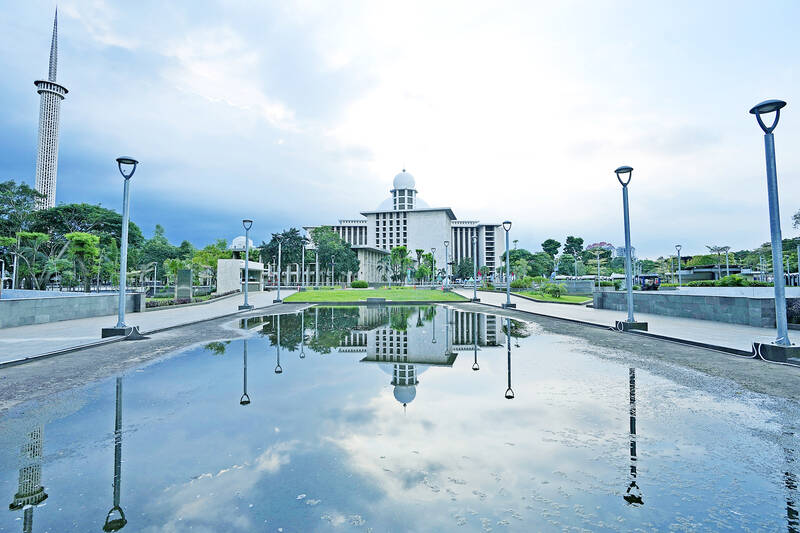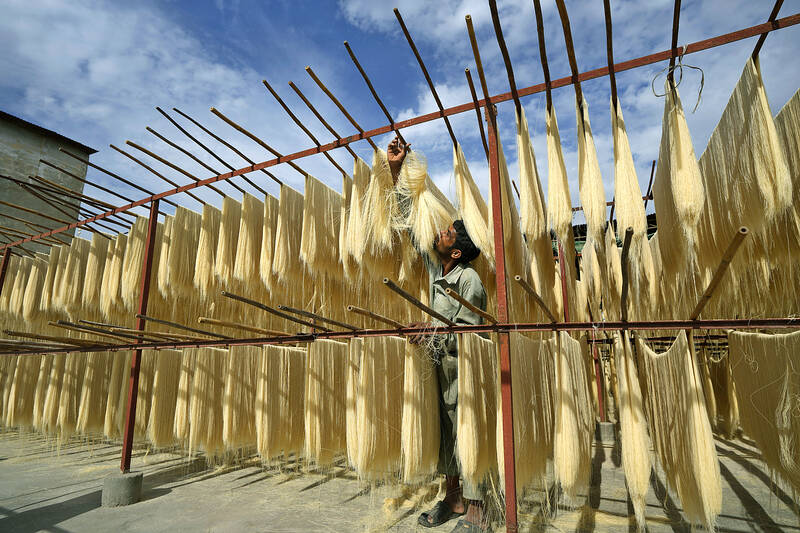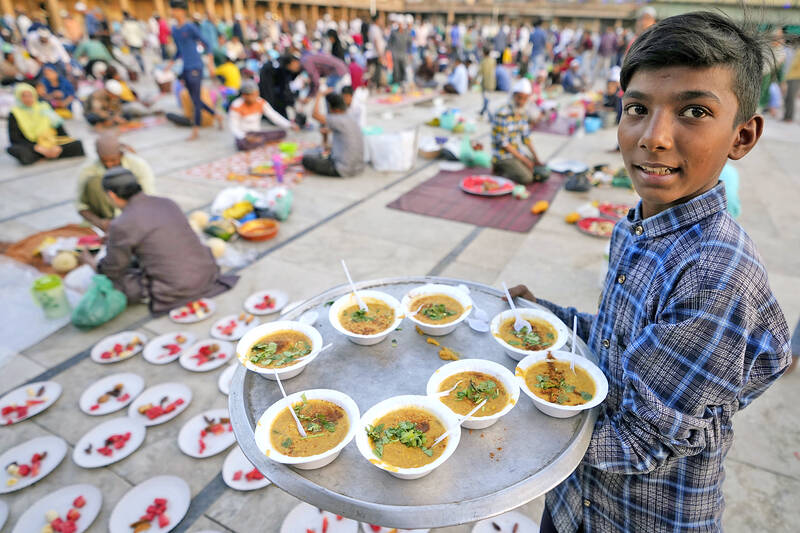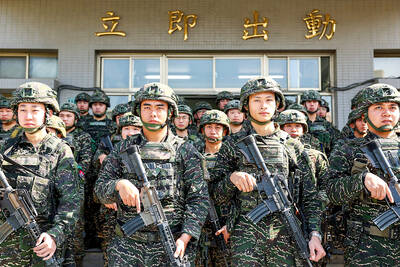In the heart of Jakarta, the grand Istiqlal Mosque was built with a vision for it to stand for a thousand years.
The mosque was conceived by Soekarno, Indonesia’s founding father, and was designed as an impressive symbol for the country’s independence. Its seven gates — representing the seven heavens in Islam — welcome visitors from across the archipelago and the world into the mosque’s lofty interior.
But they don’t just see the light here. It fuels them.

Photo: AP
A major renovation in 2019 installed upwards of 500 solar panels on the mosque’s expansive roof, now a major and clean source of Istiqlal’s electricity. And this Ramadan, the mosque has encouraged an energy waqf — a type of donation in Islam that continues to bear fruit over time — to grow its capacity to make renewable power.
Her Pramtama, deputy head of the Ri’ayah — or building management — division of Istiqlal Mosque, hopes that Islam’s holiest month, when the faithful flock to mosques in greater numbers, can provide momentum to Istiqlal’s solar project through donations.
‘GREEN RAMADAN’

Photo: AP
The mosque’s climate push is just one example of different “Green Ramadan” initiatives in Indonesia and around the world that promote an array of changes during the Muslim holy month, which has fasting and, in many cases, feasting elements as people gather to break their fasts.
In a month where restraint and charity are emphasized, recommendations can include using less water while performing the ritual washing before prayers, replacing plastic bottles and cutlery during community iftars with reusable ones and reducing food waste. Other suggestions include carpooling to mosques, using local produce, emphasizing recycling and using donations to fund clean energy projects.
For the world to limit the effects of climate change — which is already causing worsening droughts, floods and heat waves — the use of dirty fuels for electricity and transport, petrochemicals to make products like plastics and the emissions from food waste in landfills all need to be drastically slashed, scientists say. Though individual initiatives are just a small part of that transition, experts say growing momentum behind climate goals can have an effect.

Photo: AP
Groups taking an Islamic-based approach often highlight environmental understandings of certain Quranic verses and sayings and practices of Prophet Muhammad about the earth, water and against wastefulness.
Last year, at a meeting of the Muslim Congress for Sustainable Indonesia, the country’s vice president Ma’ruf Amin called on clerics and community leaders “to play an active role in conveying issues related to environmental damage” and asked for concrete action on climate change including through donations to solar projects like those at Istiqlal Mosque.
Muhammad Ali Yusuf, a board member at the faith-based Nahdlatul Ulama’s Institution for Disaster Management and Climate Change in Indonesia, said spreading awareness about clean energy is a “shared responsibility” for Muslims, where mosques’ own solar panel installations can be catalysts toward a greater transition.
In the US and Canada, environmental groups that began springing up in Muslim communities in the mid-2000s independently from one another formed “green Muslim understandings” from within their religious traditions, according to Imam Saffet Catovic, a US Muslim community environmental activist.
“In some cases, the mosques were receptive to it,” he said. In others, mosque leaders, “didn’t fully understand” the drive, he added.
Ramadan offers a “possibility for ecological training that’s unique to the Muslim community,” Catovic said. “Thirty days allow someone to change their habits.”
‘ECO-FRIENDLY COMMUNITY’
The Islamic Society of North America website calls on Muslims to be “an eco-friendly community,” saying looking after the environment is “based upon the premise that Islam has ordained us to be the stewards and protectors of this planet.”
Some mosques and Muslims around the world are heeding such calls, one small step at a time.
Ahead of Ramadan this year, the mosque at Al Ma’hadul Islamic Boarding School in Indonesia received solar panels through Islamic donations, supplying enough energy for the mosque’s entire needs. The electricity from the solar panels also lights up schools and roads in the vicinity.
The Nizamiye Mosque in Johannesburg, South Africa, with its towering minarets and spacious interior, has a roof dotted with domes and solar panels that help keep the power on at the mosque and its surrounding schools, clinic and bazaar.
The 143 panels cover over a third of the complex’s energy use in a country that has struggled in recent years to provide enough electricity through its strained grid.
In Edison, New Jersey, Masjid Al-Wali, a mosque and community center, has been adopting changes such as selling reusable water bottles to members at cost and installing more water coolers to discourage the use of disposable plastic bottles, said board member Akil Mansuri.
“Preserving the environment is the Islamically right thing to do,” Mansuri said. “People accept the message, but adoption is always slower.”
Several years ago, Masjid Al-Wali, whose activities include an Islamic school and monthly community dinners, installed solar panels.
Meals this Ramadan for the mosque’s community iftars come in plastic pre-packaged boxes for now, Mansuri said. But mosque leaders encourage members to take leftovers and reuse the boxes, instead of throwing them away, he said, adding he hopes alternatives can be found next Ramadan.
In the UK, Projects Against Plastic, a Bristol-based charity, is leading a plastic-free Ramadan campaign.
“I feel like, as a Muslim, that mosques are the hub of the communities and they should take a little bit more leading role for sustainability and toward recycling,” PAP founder Naseem Talukdar said. “During the month of Ramadan is where I’ve really seen a ridiculous amount of plastic being used and thrown away.”
RAISING AWARENESS
Mosques are urged to raise awareness on plastic pollution and reduce reliance on single-use plastic. Seven Bristol mosques participated in a pilot project last year, with varying results, and a national campaign, with more than 20 participating mosques, was rolled out this year.
Besides education, another challenge is when mosques don’t have enough funds to buy reusable cutlery, dishwashers and water fountains.
“We knew we were going to hit some hard walls and some pushbacks, but, to be honest, the engagement that we’ve seen so far, it was a little overwhelming,” Talukdar said. “Even though the progress is slow, but there’s a real appetite for this kind of initiative within the mosque.”
Ummah for Earth, an alliance-led initiative that aims to empower Muslim communities facing climate change, is urging people to pledge to adopt one eco-friendly practice during Ramadan. Options include asking an imam to address environmental issues, donating to environmental charities and shopping sustainably.
“Many Muslims are not aware that there are environmental teachings in the Quran and the sayings of the prophet and that they have a role that they can play to protect the planet,” said Nouhad Awwad, Beirut-based campaigner and global outreach coordinator for the Ummah for Earth project at Greenpeace MENA.
As they work to raise awareness, campaigners often encounter the argument that climate change is “destined” and that “you cannot change God’s destiny,” Awwad said.
“We’re trying to change the narrative,” she said. “We have things that we can do on an individual level, on a community level and on a political level.”

That US assistance was a model for Taiwan’s spectacular development success was early recognized by policymakers and analysts. In a report to the US Congress for the fiscal year 1962, former President John F. Kennedy noted Taiwan’s “rapid economic growth,” was “producing a substantial net gain in living.” Kennedy had a stake in Taiwan’s achievements and the US’ official development assistance (ODA) in general: In September 1961, his entreaty to make the 1960s a “decade of development,” and an accompanying proposal for dedicated legislation to this end, had been formalized by congressional passage of the Foreign Assistance Act. Two

President William Lai’s (賴清德) March 13 national security speech marked a turning point. He signaled that the government was finally getting serious about a whole-of-society approach to defending the nation. The presidential office summarized his speech succinctly: “President Lai introduced 17 major strategies to respond to five major national security and united front threats Taiwan now faces: China’s threat to national sovereignty, its threats from infiltration and espionage activities targeting Taiwan’s military, its threats aimed at obscuring the national identity of the people of Taiwan, its threats from united front infiltration into Taiwanese society through cross-strait exchanges, and its threats from

Despite the intense sunshine, we were hardly breaking a sweat as we cruised along the flat, dedicated bike lane, well protected from the heat by a canopy of trees. The electric assist on the bikes likely made a difference, too. Far removed from the bustle and noise of the Taichung traffic, we admired the serene rural scenery, making our way over rivers, alongside rice paddies and through pear orchards. Our route for the day covered two bike paths that connect in Fengyuan District (豐原) and are best done together. The Hou-Feng Bike Path (后豐鐵馬道) runs southward from Houli District (后里) while the

March 31 to April 6 On May 13, 1950, National Taiwan University Hospital otolaryngologist Su You-peng (蘇友鵬) was summoned to the director’s office. He thought someone had complained about him practicing the violin at night, but when he entered the room, he knew something was terribly wrong. He saw several burly men who appeared to be government secret agents, and three other resident doctors: internist Hsu Chiang (許強), dermatologist Hu Pao-chen (胡寶珍) and ophthalmologist Hu Hsin-lin (胡鑫麟). They were handcuffed, herded onto two jeeps and taken to the Secrecy Bureau (保密局) for questioning. Su was still in his doctor’s robes at